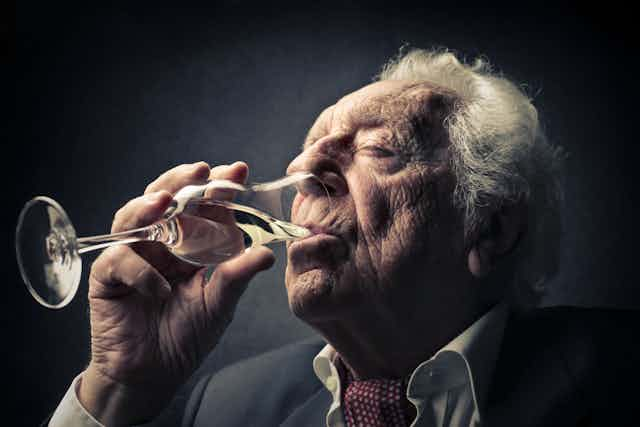The “baby boomers”, those born during the surge of births between 1946–1964, comprise around a quarter of the population in the UK. In sociological terms they are wedged between the “Silent Generation” and “Generation X”. Brought up in the 50s, 60s and early 70s, boomers are distinct from previous generations for their greater indulgence in aesthetic, hedonistic lifestyles.
One of the greatest social influences on baby boomers is evident in their drinking behaviour, perhaps a product of their formative years during which advertising for alcohol and tobacco was widespread. Now aged between 51 and 70, this behaviour threatens to cause them great harm towards the end of their lives.
Between 1992 and 2006, the average weekly alcohol consumption for people aged 45–64 (capturing the majority of baby boomers) rose by 85%, compared with a 50% rise in those aged 65 and over, and a 45% rise in those aged 16–24. As baby boomers have aged, follow-up studies with this cohort reveal similar findings. Between 2005 and 2013, the percentage of men drinking eight or more units of alcohol (the equivalent of four pints of normal strength beer) on any one day in the past week changed by only 5% in the over 65s. In contrast, this rate of drinking fell by 30% among 16–24s, 19% among 22–44s, and 12% among those aged 45–64.
Using other data reveals the same drinking patterns among baby boomers. Between 2001 and 2014, alcohol-related deaths in England reduced significantly among men under 60, but was significantly higher in both older men and women. For example, in men aged 70–74 and 80–84, alcohol-related deaths rose by more than 150%.
Alcohol-related admissions to hospital have also risen fastest among this generation, with admissions for mental and behavioural disorders attributable to alcohol now outnumbering alcoholic liver disease in people aged 60 and over in England. And this is not down to demographics: this increase in alcohol-related admissions and deaths far outstrips the actual rise in numbers of older people over the same time frames.
Drug use is also evident among baby boomers. A series of national surveys from 1993 to 2007 found that among those aged 50 to 64, lifetime use of cannabis increased more than ten-fold, from 1% in 1993 to 11.4% in 2007. Recent use had multiplied by a similar amount, from 0.2% in 1993 to 2.0% in 2007. And there’s growing evidence to suggest that this extends to prescription drugs as well as illegal narcotics, with escalating misuse of pharmaceutical drugs such as painkillers or sleeping pills.
What makes baby boomers hit the bottle?
There are likely to be several possible explanations for the increase in alcohol consumption among older people, and the corresponding decrease among younger people in Britain. Although alcohol is more affordable than it was 30 years ago, economic and financial pressures such as a lack of affordable housing, university tuition fees, less time for socialising due to work pressures, and changes to laws governing drinking in public places may all have influenced drinking behaviour among people aged 16–24.
Older drinkers on the other hand will have more disposable income than other generations as they enter their retirement. In fact, high socio-economic status is known to be associated with a greater likelihood of drinking above recommended limits. Other aspects such as retirement, bereavement and social isolation may also be significant factors in why older people maintain or even escalate their drinking habits.
As it happens, public health campaigns tend to focus on younger people getting drunk in public at weekends, rather than those older people who drink at home in larger amounts spread throughout the week. Some baby boomers drink steadily throughout the week but also indulge in other risky behaviours from their younger days. We know that the culture of drinking to get drunk is common in Britain, as it is in Scandinavian countries.
Trying to change baby boomers’ behaviour and attitudes towards drinking and drug use is a tough sell to a generation now steeped in lifelong attitudes shaped by a lack of awareness of the harms of alcohol and substance misuse. To address the spectrum of problems these attitudes have wrought will require a concerted effort from public health campaigners and doctors.
In January 2016, the government’s chief medical officer reduced the upper recommended weekly alcohol limit by a third, from 21 units a week to 14 for both men and women. There is also new guidance on how to assess and manage alcohol and drug misuse among older people, as well as efforts to improve the way older people are treated by various components of the health service for their alcohol and drug misuse. Whether these can help improve lives and reduce harm remains to be seen, but that the hedonistic baby boomers will continue their habits of a lifetime seems certain for now.

